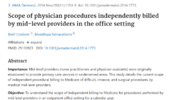- Joined
- Nov 2, 2019
- Messages
- 3,601
- Reaction score
- 14,885
- Points
- 6,041
- Attending Physician
Oh yeah I forgot about this:Just saw the AMA is considering or has already dumped us? Wtf?
It's just such classic RadOnc and par for the course. I know the AMA is a polarizing subject for people, but regardless of what you think about it, it does have power.
The theme of the last 20 years is hubris. The people in charge watched the field become ultra-competitive through the serendipity of the fee-for-service system of American medicine and the perception that we're a "lifestyle" specialty. Anyone who says anything else is either lying to themselves or selling you something.
Hubris played a part in our disengagement with the ACR. Hubris played a part in the AMA putting our main specialty society on probation.
Now, after 10 years of reimbursement cuts, bundled payment models are being implemented for half of us and the cuts are continuing for all of us. ASTRO's $300k in lobbying money is barely enough to cover a few dinners for Senators; we have no one to blame but ourselves.
But don't forget, low unemployment for new grads per a survey sent out by the resident subdivision of the society that is currently on probation, and 50% of academic chairs said they might hire in the next 2-3 years per a different survey sent out by a chair to his buddies, so everything is fine, and we're just a bunch of toxic misanthropes for even bringing this up.




